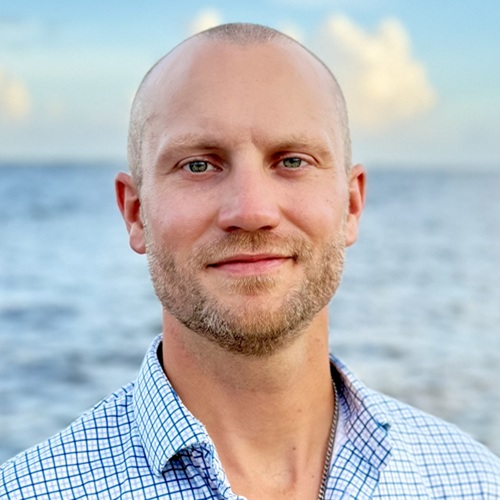I'm a Financial Planner: Coast FI Planning Could Be High Earners' Secret Retirement Weapon in the AI Age
A subset of the FIRE (Financial Independence, Retire Early) movement, Coast FI can help executives figure out whether their investments are enough to 'coast' so they can retire early and comfortably.


Profit and prosper with the best of Kiplinger's advice on investing, taxes, retirement, personal finance and much more. Delivered daily. Enter your email in the box and click Sign Me Up.
You are now subscribed
Your newsletter sign-up was successful
Want to add more newsletters?

Delivered daily
Kiplinger Today
Profit and prosper with the best of Kiplinger's advice on investing, taxes, retirement, personal finance and much more delivered daily. Smart money moves start here.

Sent five days a week
Kiplinger A Step Ahead
Get practical help to make better financial decisions in your everyday life, from spending to savings on top deals.

Delivered daily
Kiplinger Closing Bell
Get today's biggest financial and investing headlines delivered to your inbox every day the U.S. stock market is open.

Sent twice a week
Kiplinger Adviser Intel
Financial pros across the country share best practices and fresh tactics to preserve and grow your wealth.

Delivered weekly
Kiplinger Tax Tips
Trim your federal and state tax bills with practical tax-planning and tax-cutting strategies.

Sent twice a week
Kiplinger Retirement Tips
Your twice-a-week guide to planning and enjoying a financially secure and richly rewarding retirement

Sent bimonthly.
Kiplinger Adviser Angle
Insights for advisers, wealth managers and other financial professionals.

Sent twice a week
Kiplinger Investing Weekly
Your twice-a-week roundup of promising stocks, funds, companies and industries you should consider, ones you should avoid, and why.

Sent weekly for six weeks
Kiplinger Invest for Retirement
Your step-by-step six-part series on how to invest for retirement, from devising a successful strategy to exactly which investments to choose.
Company executives are facing a career planning landscape with two unique challenges. Many have received restricted stock units (RSUs), non-qualified stock options (NSOs) and incentive stock options (ISOs) as a significant part of compensation, and a stock market tailwind has rewarded their hard work with meaningful wealth.
This "golden handcuffs" comp structure incentivizes sticking around through rolling vesting periods, and the concentrated stock positions can make portfolios feel precarious.
Meanwhile, AI implementation and economic uncertainty are calling the security of many roles into question.
From just $107.88 $24.99 for Kiplinger Personal Finance
Become a smarter, better informed investor. Subscribe from just $107.88 $24.99, plus get up to 4 Special Issues

Sign up for Kiplinger’s Free Newsletters
Profit and prosper with the best of expert advice on investing, taxes, retirement, personal finance and more - straight to your e-mail.
Profit and prosper with the best of expert advice - straight to your e-mail.
The confluence of these two challenges leads to executives feeling stuck while doing well and building real wealth while feeling unstable. How can executives plan thoughtfully for freedom in a world that's changing so fast?
Kiplinger's Adviser Intel, formerly known as Building Wealth, is a curated network of trusted financial professionals who share expert insights on wealth building and preservation. Contributors, including fiduciary financial planners, wealth managers, CEOs and attorneys, provide actionable advice about retirement planning, estate planning, tax strategies and more. Experts are invited to contribute and do not pay to be included, so you can trust their advice is honest and valuable.
A financial planning style known as Coast FI (short for Coast Financial Independence) may hold a compelling solution to the planning needs of modern professionals.
What is Coast FI?
Coast FI is a subset of the FIRE (Financial Independence, Retire Early) movement. I'm not a personal fan of the FIRE movement, as it most often leads to casual versions of financial planning, attaching personal identity to one component of a plan (a future retirement date) and a challenging shift to spending down assets after years of deferring joy to get there.
However, if done well, a FIRE plan can serve as a financial plan attached to a personal retirement goal.
Coast FI takes this idea and, instead of simply saving to retire as early as possible, encourages a focus on a different question: How much would you need to have invested, such that if you didn't touch your nest egg, it would grow to support your future retirement spending needs?
Then you're free to work only as much as needed to support your current lifestyle — in other words, you're free to let your investments coast.
This takes the simple calculus of an early retirement plan and adds an important lever — one for optionality. It also more closely mirrors the actual trajectory of most people's retirement.
Rather than a one-and-done retirement date, executives more often have corporate exits and reentries, unplanned exits, sabbaticals, consulting jobs and so on. Coast FI isn't built on "retirement" — it's built on flexibility.
For a high-earning modern executive, it reframes the question from "How much more do I need?" to "How much freedom have I already earned?"
How Coast FI addresses golden handcuffs
The goal of "golden handcuffs" like RSUs and stock options is to retain employees with rolling vesting schedules, making it challenging (or at least expensive) to target an exit point.
Personal goals might get delayed while promotions add to equity but not directly to freedom. If you're always a quarter away from your next vest, when do you leave?
If you add to this "the new golden handcuffs" of the increasing cost of living and an executive's strong tie to professional identity, you can see how barriers toward exit targets are ever-present.
To address golden handcuffs in a retirement plan, most people will intuitively look at a few key variables:
- The current size of their investment portfolio
- The target size of their future retirement portfolio
- How much additional investing needs to happen to get there
Where Coast FI helps executives move toward freedom is by including annual cash flow needs into the equation. At a certain point, a Coast FI plan will show that no more investing is needed to reach the defined goals, assuming no withdrawals happen until then.
This number will change each year based on portfolio growth and the years remaining until retirement.
With this number defined, an executive might find that they are able to make their corporate exit without waiting around for future vesting dates or use a few consulting contracts to cover living expenses and begin to loosen their golden handcuffs.
How Coast FI addresses job instability
While executives are locked into golden handcuffs, we are seeing regular reports of layoffs and how AI innovation is coming for white-collar jobs. This isn't the best position from which to do real, high-quality, financial planning.
Looking for expert tips to grow and preserve your wealth? Sign up for Adviser Intel (formerly known as Building Wealth), our free, twice-weekly newsletter.
This is where the Coast FI philosophy can again be helpful, offering crucial information and flexibility as your career develops:
- Have a great job? Continue saving
- Receive a bonus or additional equity? You're closer to your Coast FI number
- Want to leave to consult? Set your revenue targets aligned with your plan
Get laid off? You know exactly how much you need to make to cover your living expenses at every point along the way
In an uncertain world, modern executives don't need to focus only on an arbitrary early retirement in the future, but also on adaptability throughout their careers. As the AI wave progresses, the Coast FI philosophy offers a sound default way of financial planning so that executives can use their company equity and hard work to build both wealth and freedom.
A Coast FI example
Let's look at "Chris and Jessica" and build a Coast FI plan for them.
The "coast" number. Chris and Jessica are 40-year-old tech executives. They have calculated that at age 60, they'll need $5,000,000 in today's dollars to fund their desired retirement.
To find their Coast number, they'll take the 20 years they have left before retirement, a rate of return for their investments and an inflation rate that will let them calculate how big their nest egg would need to be today to stop saving now.
That math, written out, would look like this:
$5,000,000 * (1+.04) ^ -20 = $2,281,935
So we arrive at Chris and Jessica needing about $2.28 million saved today, growing at 7% per year minus a 3% rate of inflation for the next 20 years to fully fund their retirement goals at age 60.
Equity over time. Chris and Jessica will continue to receive income and equity awards throughout their working years. Their Coast FI plan will help them target savings vs spending rates and build their plans to sell and diversify company stock to meet their goals.
Cash flow targets. Both while working and in the event of a job change, Chris and Jessica's Coast FI plan will tell them how much money they can spend and how much they need to save in any given year to hit their Coast FI number. Once they've hit their number, they can adjust their income need down to reflect no longer needing to save.
The biggest asset of the Coast FI philosophy is the ability to review and refine all the applicable numbers at any point to stay on track with changing careers, markets and goals. This ability makes it a powerful default planning framework.
Financial plans need to be strong enough to build on and flexible enough to withstand changes without breaking.
For the modern executive, especially those looking to build freedom from golden handcuffs in a quickly changing environment, Coast FI plans may offer a convenient mental shortcut to set goals, target action steps and adapt to changes over time.
Related Content
- Why Company Stock May Be Riskier Than Employees Realize
- Got Company Stock in Your 401(k)? You Should Know about NUD
- Seven Surprising Reasons Retirees Are Going Back to Work
- Could a Micro-Retirement Be the Refresh You Need?
- How to Retire Early in Six Steps
Profit and prosper with the best of Kiplinger's advice on investing, taxes, retirement, personal finance and much more. Delivered daily. Enter your email in the box and click Sign Me Up.

Zach is co-founder and Chief Planning Officer of Reach Strategic Wealth, where he specializes in tax-efficient corporate exit planning for executives. With over a decade of experience as a professional adviser, he is passionate about bridging the critical gap in quality tax planning that exists between traditional investment advisors and tax preparers. Beyond his professional expertise, Zach brings a unique perspective shaped by his personal journey as a former foster parent and current adoptive parent. He actively mentors others navigating their own adoption processes, combining his strategic planning skills with genuine compassion for families in transition.
-
 Quiz: Do You Know How to Avoid the "Medigap Trap?"
Quiz: Do You Know How to Avoid the "Medigap Trap?"Quiz Test your basic knowledge of the "Medigap Trap" in our quick quiz.
-
 5 Top Tax-Efficient Mutual Funds for Smarter Investing
5 Top Tax-Efficient Mutual Funds for Smarter InvestingMutual funds are many things, but "tax-friendly" usually isn't one of them. These are the exceptions.
-
 AI Sparks Existential Crisis for Software Stocks
AI Sparks Existential Crisis for Software StocksThe Kiplinger Letter Fears that SaaS subscription software could be rendered obsolete by artificial intelligence make investors jittery.
-
 Quiz: Do You Know How to Avoid the 'Medigap Trap?'
Quiz: Do You Know How to Avoid the 'Medigap Trap?'Quiz Test your basic knowledge of the "Medigap Trap" in our quick quiz.
-
 5 Top Tax-Efficient Mutual Funds for Smarter Investing
5 Top Tax-Efficient Mutual Funds for Smarter InvestingMutual funds are many things, but "tax-friendly" usually isn't one of them. These are the exceptions.
-
 Why Invest In Mutual Funds When ETFs Exist?
Why Invest In Mutual Funds When ETFs Exist?Exchange-traded funds are cheaper, more tax-efficient and more flexible. But don't put mutual funds out to pasture quite yet.
-
 We Retired at 62 With $6.1 Million. My Wife Wants to Make Large Donations, but I Want to Travel and Buy a Lake House.
We Retired at 62 With $6.1 Million. My Wife Wants to Make Large Donations, but I Want to Travel and Buy a Lake House.We are 62 and finally retired after decades of hard work. I see the lakehouse as an investment in our happiness.
-
 Social Security Break-Even Math Is Helpful, But Don't Let It Dictate When You'll File
Social Security Break-Even Math Is Helpful, But Don't Let It Dictate When You'll FileYour Social Security break-even age tells you how long you'd need to live for delaying to pay off, but shouldn't be the sole basis for deciding when to claim.
-
 I'm an Opportunity Zone Pro: This Is How to Deliver Roth-Like Tax-Free Growth (Without Contribution Limits)
I'm an Opportunity Zone Pro: This Is How to Deliver Roth-Like Tax-Free Growth (Without Contribution Limits)Investors who combine Roth IRAs, the gold standard of tax-free savings, with qualified opportunity funds could enjoy decades of tax-free growth.
-
 One of the Most Powerful Wealth-Building Moves a Woman Can Make: A Midcareer Pivot
One of the Most Powerful Wealth-Building Moves a Woman Can Make: A Midcareer PivotIf it feels like you can't sustain what you're doing for the next 20 years, it's time for an honest look at what's draining you and what energizes you.
-
 Stocks Make More Big Up and Down Moves: Stock Market Today
Stocks Make More Big Up and Down Moves: Stock Market TodayThe impact of revolutionary technology has replaced world-changing trade policy as the major variable for markets, with mixed results for sectors and stocks.